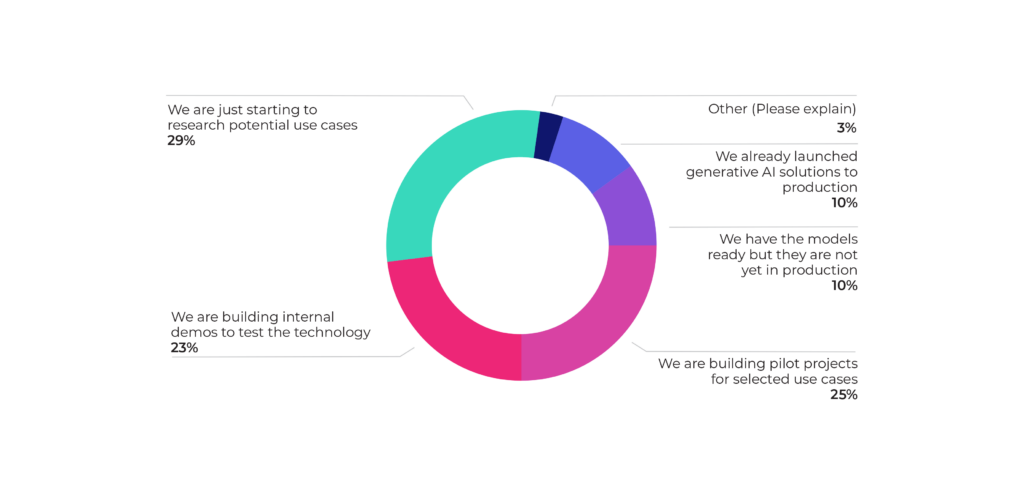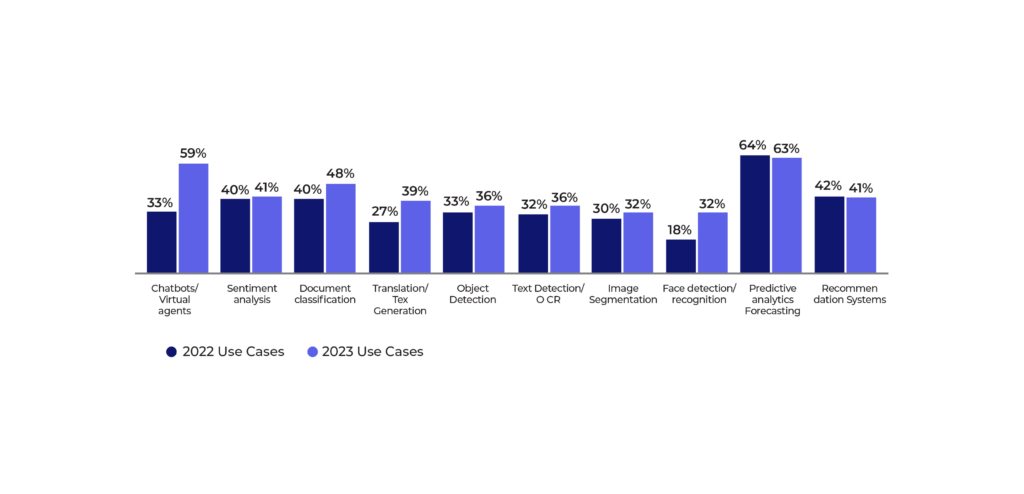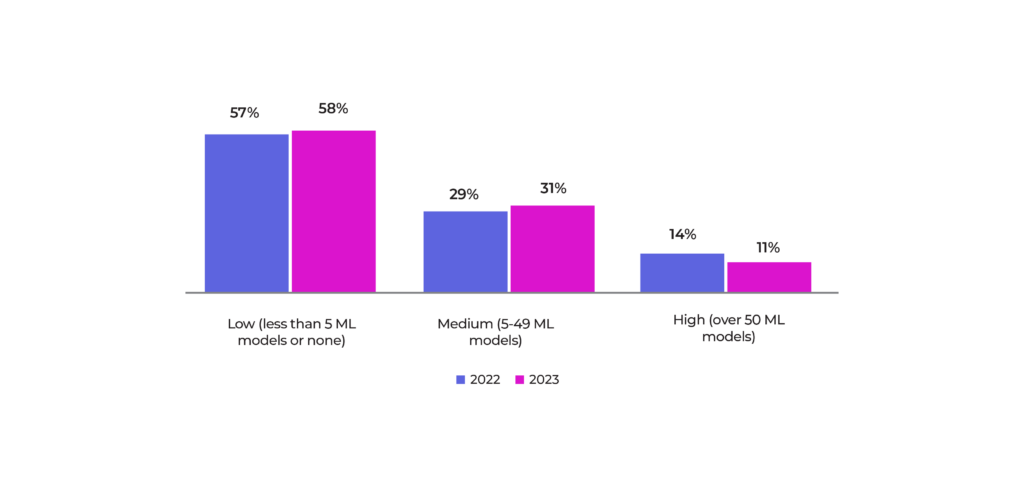

The state of Generative AI and Machine Learning at the end of 2023
What is ML Insider?
The ML industry is rapidly evolving with new developments breaking ground every day. The ML Insider survey is an annual report meant to reveal the greatest challenges and the latest trends in tools and strategies for building successful AI and Generative AI (GenAI) use cases. cnvrg.io, an Intel company surveyed 430 AI & ML practitioners to get the full story behind ML & GenAI development in the enterprise.
This year, the survey reveals valuable insights about how AI practitioners see GenAI technology, common development challenges, and tracks how AI maturity has developed since the first ML Insider survey in 2021.
This page offers some highlights from the report. Fill out the form to get your copy of the full report with deeper insights, and breakdowns of how responses change between company sizes, industries and more.
Who took this survey?
The survey covered 430 participants, representing organizations in size from a few employees to thousands of employees. 51% of respondents came from companies with 600 employees or larger.
The insights from the survey covered dozens of industries; among the most common were: Information Technology Services, Computer Software, Financial Services/Banking, Education, Healthcare, Consumer Goods, Telecommunications, Automotive, Insurance, Media/Entertainment, and Defense.
28% of all respondents are data scientists, 23% engineering/DevOps and 17% in software development roles. More detailed demographic information can be found in section 5 of the report.
Key Takeaways and Trends
- Despite the hype, more than half of respondents found Generative AI to be only moderately, slightly or not important at all to their organizations future AI strategy
- 10% of organizations launched GenAI solutions to production in 2023
- Nearly half of AI professionals see infrastructure as the largest barrier to productionizing LLMs
- 8 out of 10 respondents admit their skills need to improve due to the increased interest in LLM adoption
- Chatbots and translation/text generation AI use cases are on the rise
- AI integration remains low as this continues to be a difficult area to execute
- 62% of AI professionals continue to say it is difficult to execute a successful AI project
Despite the hype, more than half of respondents found Generative AI to be only moderately, slightly or not important at all to their organizations future AI strategy
44% of the respondents consider Generative AI to be very, or extremely important. While the majority of respondents found that GenAI is only moderately important to the future of organizations strategies.

How important is Generative AI in your organization’s future AI strategy?
10% of organizations launched GenAI solutions to production in 2023
Despite the hype in generative AI, only 10% of respondents said that they had already
launched GenAI solutions to production. The majority of organizations are still in the
research or testing phase of incorporating generative AI in production. Additionally, when
asked, only a quarter of respondents had declared that their organization had deployed
any generative AI models to production in the last year.

What is your current organization’s maturity level in using generative AI?
Nearly half of AI professionals see infrastructure as the largest barrier to productionizing LLMs
Infrastructure (46%) is the biggest challenge in productionizing LLMs, mentioned twice as much as the 2nd biggest challenge – monitoring (21%). As mentioned earlier, training and deploying LLMs can be quite challenging. Firstly, the immense computational power and specialized hardware required for training are substantial.

What is your biggest challenge productionizing LLMs?
8 out of 10 respondents admit their skills need to improve due to the increased interest in LLM adoption
These respondents are split between having what they need to improve these skills and not knowing where to start. LLMs require a distinct set of expertise and skills.
Managing vast amounts of data for effective learning and fine-tuning models for specific tasks demands expertise. Deployment is complex as well, involving considerations like model size, inference speed, and resource constraints.

Do you believe you need to improve your skills in your role
due to the increasing interest in LLM adoption?
Chatbots and translation/text generation AI use cases on the rise
Compared to 2022, the use of chatbots/virtual agents, as well as translation/text
generation have seen a spike as a popular AI use case.
That could be due to the rise in Large Language Model technology in 2023 and the advance in generative AI technology. Despite the low adoption of GenAI, it appears there is still a focus on GenAI solutions.

AI/ML use cases by popularity 2022 vs 2023
AI integration remains low as this continues to be a difficult area to execute
Since 2022, AI maturity has not seen substantial growth over the last year. 58% of respondents currently have a low level of AI integration with no more than 5 models running. Only 11% are running over 50 ML models.
These results are statistically equal to prior years. 26% of large companies with more than 5,000 employees are running 50 or more ML models in their organization.

What level of AI integration exists in your organizations applications 2022 vs 2023
Two-thirds of AI professionals continue to say it is difficult to execute a successful AI project
GenAI is not the only area to pose challenges. General artificial Intelligence (AI) continues to be a difficult area to execute.
10% consider it extremely difficult while 52% said it is just difficult. The survey also reveals that the larger the company, the more difficult it is to execute a successful AI project.

How would you rate the difficulty of executing successful AI projects?
Summary
Overall, the 2023 ML Insider revealed that AI maturity has not changed significantly over the last few years. The rise in GenAI technology has shifted the industry in some ways, but organizations are slow to adopt it.
Despite the hype, only 25% of organizations have deployed any genAI models to production in the past year. The survey found that infrastructure is ranked as the largest barrier to productionizing LLMs and that 84% of respondents admit their skills need to improve due to the increased interest in LLM adoption.
The survey reveals a myriad of challenges that might be causing a slow adoption of LLM technology in businesses such as lack of knowledge, cost, as well as compliance which you can learn more about in the full report.
84% of respondents admit that their skills need to improve due to the increasing interest in LLM adoption, while only 19% said they have a strong understanding of the mechanisms of how LLMs generate responses.
Additionally, respondents ranked compliance & privacy (28%), reliability (23%), the high cost of implementation (19%), and a lack of technical skills (17%) as the greatest concerns with implementing LLMs into their business. Nearly half of respondents see infrastructure as the biggest technical challenge to productionizing LLMs.
However there is no doubt that GenAI is having an impact on the industry. Compared to 2022, the use of chatbots/virtual agents has spiked 26% and translation/text generation is up 12% in 2023 as popular AI use cases. That could be due to the rise in LLM technology in 2023 and the advance in generative GenAI technology.
The full 2023 ML Insider report also reveals more about the top challenges organizations are facing when it comes to executing ML programs, how long AI teams spend from experimentation to production, popular AI tool rankings, cloud cost estimations and more.
